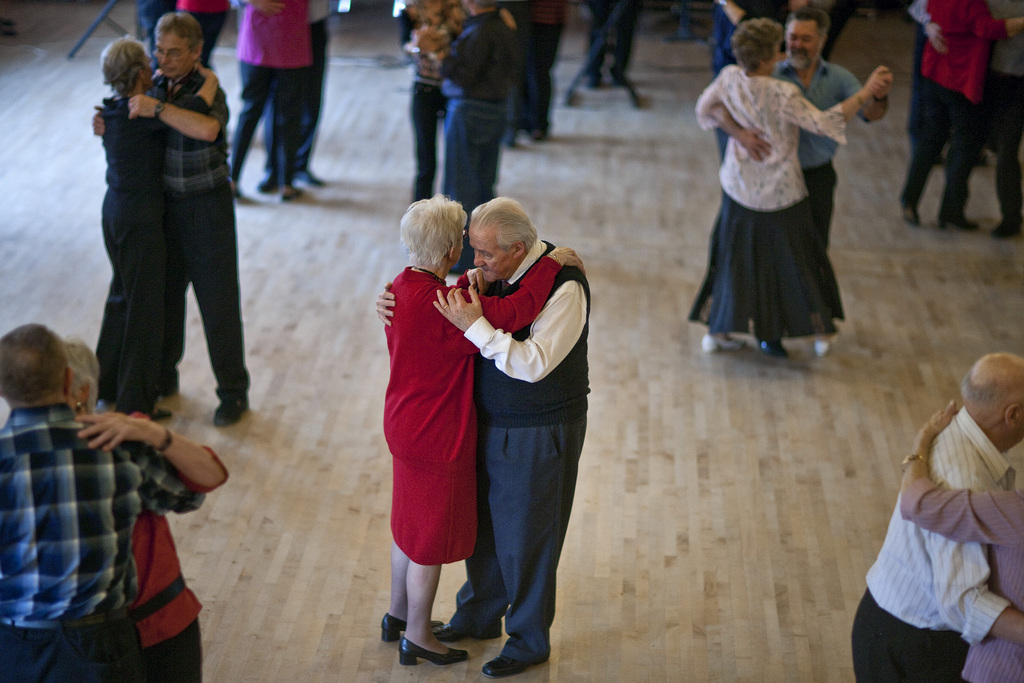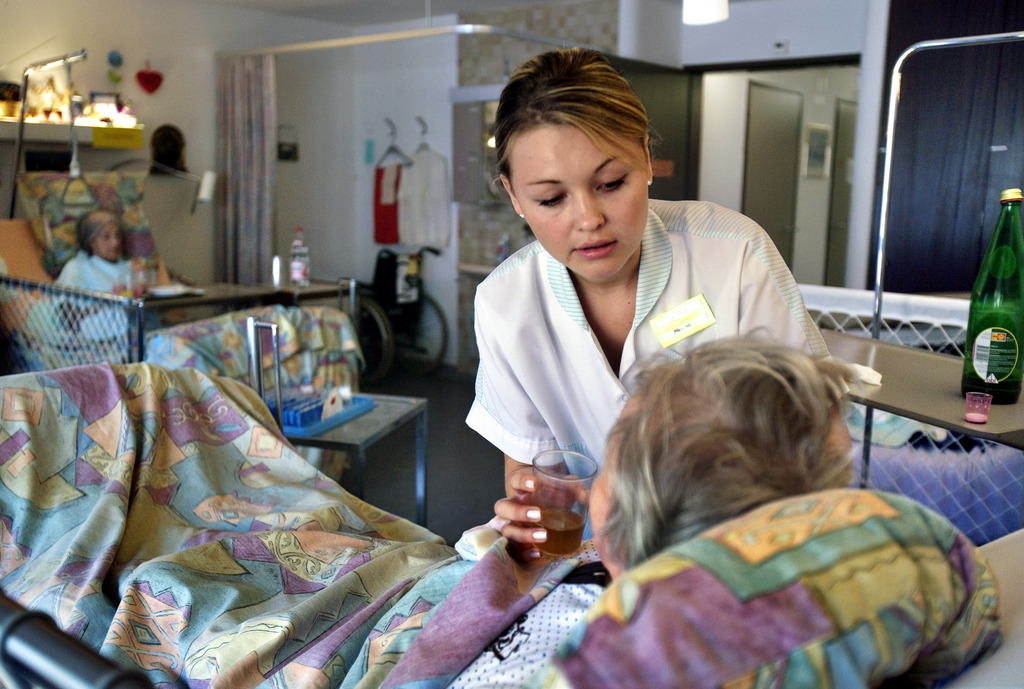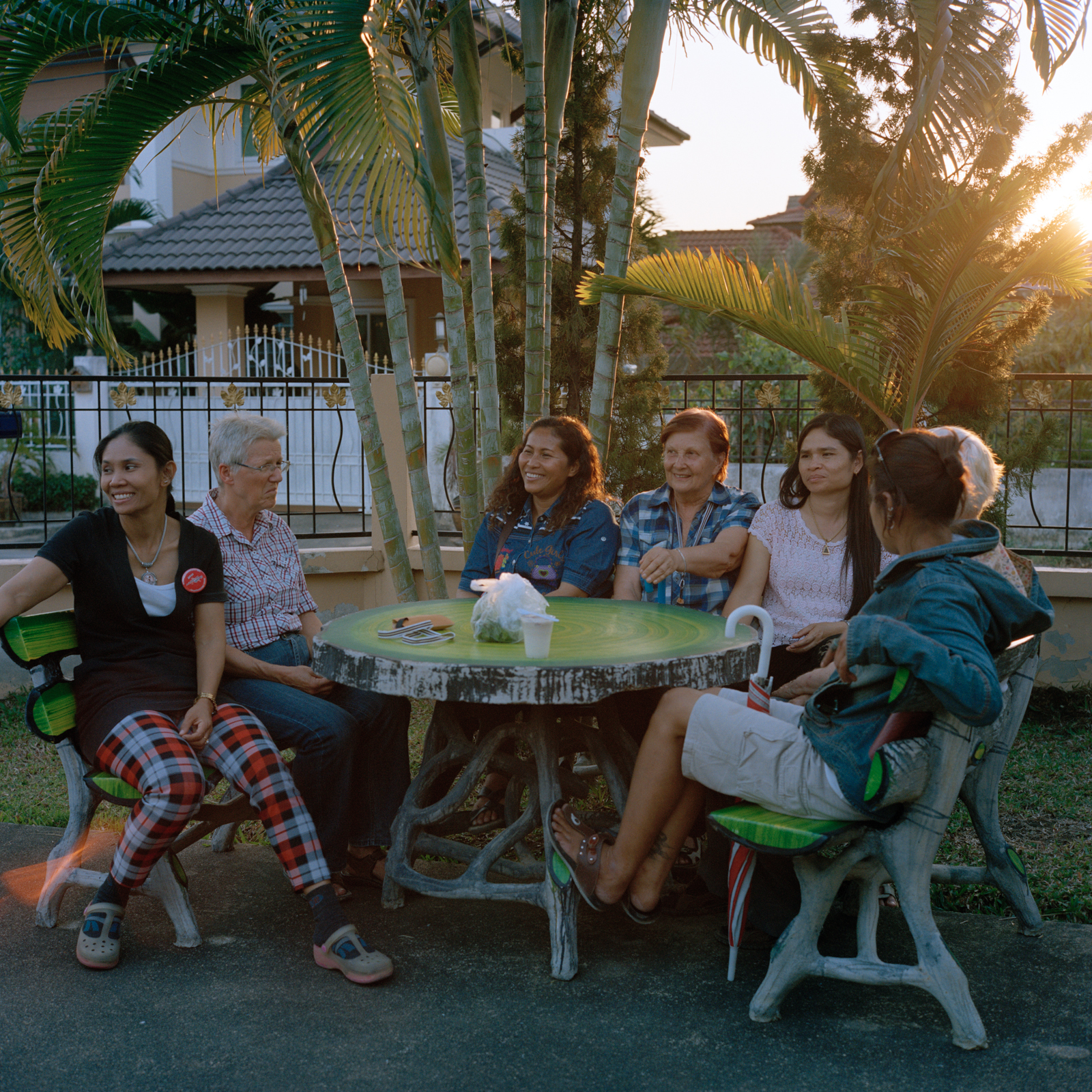Swiss politicians tackle the issue of ageing

What happens when there are many people who need care, but not enough caregivers? When many people draw money out of pension funds, but not enough pay into them? Swiss politicians are aware of the challenges, but do they have viable solutions?
Worldwide, people are living significantly longer than in the past. The life expectancy of males in Switzerland increased from 46 years in 1900 to 80 years in 2000. The Baby Boomers, born between 1946 and 1964, are heading toward retirement.
A host of issues are gaining importance due to the sheer numbers of people who will be affected by them. These range from physical and mental health to social integration to age discrimination in employment to the logistics of caring for relatives who live far away.
Overall, Swiss politicians are focusing on two overarching issues that need to be addressed: meeting the healthcare needs of the elderly and providing for their support through social insurances.
What needs to be done to defuse the demographic time bomb? swissinfo.ch talked with four members of parliament from four different parties and cantons who serve on the House of Representatives’ Committee for Social Security and Health.
Dementia
Jean-François Steiert thinks a national strategy on dementia is a priority. The number of people suffering from dementia in Switzerland – currently more than 110,000 – is expected to rise to 200,000 by 2030 and to around 300,000 by 2050. This is leading to the development of alternative forms of care, ranging from small-group living to nursing homes in foreign countries.

More
Meeting physical and mental needs
As Steiert points out, new living options will be needed for the elderly of the future.
Many elderly people suffering from disease and disability are cared for at home, either by family members or by Spitex. The move to a nursing home is often preceded by increasing disability – particularly dementia. Of around 1.4 million people (17% of the population) in Switzerland age 65 or older, just over 121,000 lived in nursing homes in 2012, with the average stay lasting 2.6 years. And patients aged 75 to 84 accounted for 20% of days spent in Swiss acute care hospitals in 2012, according to the Federal Statistical Office.
Pensions
In Switzerland in 2010 there were 27 people aged 65 and over taking money out of the old-age pension system for every 100 people 20 to 64 putting money in. By 2060 the Statistical Office predicts that there will be 53 taking out per 100 paying in. Obviously, something needs to be done. There are a number of issues to consider, in the opinion of Yvonne Gilli.

More
Investing in the elderly
Interior Minister Alain Berset is currently working on a major revision of the Swiss social security and pension system. “Retirement 2020” was sent out by the cabinet for comment in November 2013, and a draft bill incorporating the suggestions received is expected to be presented to the parliament by the end of 2014. (For details, see box at end of story.)
Working longer
Jürg Stahl supports one of the main changes to the system: raising the retirement age for women.
Berset’s bill will not have an easy time. Whereas the centre-left Social Democrats are steadfastly against raising the retirement age for women, the trade unions are against lowering pensions, and the Swiss Employers’ Association is against increasing VAT.
Historically, the three most recent attempts to revise the system were rejected – in 2004 and 2010 by Swiss voters and in 2010 by the House. A major sticking point in both years was increasing the retirement age for women from 64 to 65. A reduction in occupational pension benefits was rejected by voters in 2010.
Solidarity
Christian Lohr makes a plea for more ‘solidarity’ – which essentially requires people to make sacrifices for the good of others. Solutions should be fair for both young and old, he finds.

More
Sharing the burden
Lohr’s views echo those of Pro Senectute Switzerland, the largest Swiss organization representing the needs of the elderly. It reports that by the year 2060 there will be around one million people age 80 and older living in Switzerland – 11% of the population – compared with 400,000 (5%) today. In April 2014 the organisation launched a national campaign with the slogan “Alles hat seine ZeitExternal link” (A time for everything), designed to raise awareness of the fact that senior citizens should not be viewed as financial burdens but rather as valuable members of society.
ProSenectute sums up the dilemma facing today’s politicians: “Focusing on the costs of care and pension reform downplays the fact that all generations belong to our society, and is a threat for societal solidarity.”
Among the proposed changes presented by Interior Minister Alain Berset are:
- Raising the age at which early retirement is possible, and encouraging people to keep working after 65
- Lowering the “minimum conversion rate” of the 2nd pillar from 6.8% to 6%, meaning that a pensioner would receive CHF6000 ($6,700) per year instead of CHF6800 ($7,600) per year for each CHF100,000 paid into the pension plan over a working lifetime.
- Requiring workers to pay into the 2nd pillar beginning at age 18, instead of age 25
- Increasing the Value Added Tax on goods and services from 8% to 10%, in two stages.
An additional change proposed by the Conservative Democratic Party and approved by parliament in spring 2014 may also be incorporated. This would require the retirement age to be tied to average life expectancy.

In compliance with the JTI standards
More: SWI swissinfo.ch certified by the Journalism Trust Initiative




You can find an overview of ongoing debates with our journalists here . Please join us!
If you want to start a conversation about a topic raised in this article or want to report factual errors, email us at english@swissinfo.ch.